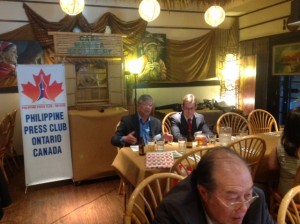
Rose Tijam, PPCO president, welcoming guests to the second instalment of PPCO’s speaker series. PHOTOS BY MARISA ROQUE
TORONTO, Ontario — The Philippine Press Club of Ontario (PPCO) on June 24 hosted members and guests at the second in a series of in-depth information sessions on topics of interest to members.
The topics focused on press freedom vis-a-vis libel and defamation, presented by Mark Donald and the question of capacity and mental health, presented by Ramon Andal.
Mark Donald, litigation lawyer at M-F Law, focuses on commercial, civil and media/defamation matters in his practice. Donald explained that in order to make a successful claim in defamation, a plaintiff must initially prove three elements: (1) that the defendant’s comment must have been published to a third party; (2) that the defendant’s comment must refer to the plaintiff; and (3) the defendant’s comment must be legally “defamatory”–that the plaintiff must show that the impugned statement would damage their reputation in the eyes of a “reasonable” listener or reader.
Among other things, Donald also discussed a plaintiff’s first line of defense in a defamation case–the deadline for bringing a claim in defamation. A “gray area’ in defamation law is how long a plaintiff has to initiate a case. “In Canadian law,” says Donald, “no presumptive media defendant should have to perennially ‘look over their shoulder’ to defend articles written long ago.”
“This philosophy is especially important in a free and democratic society where we should encourage the media to engage in robust investigative journalism without fear of perennial legal sanction,” he added.
“Pursuant to the ‘Limitations Act’ (the LA) the general time limit for most legal actions such as contract disputes or negligence cases is two years from the time that the plaintiff discovered that they had a legal claim,” Donald pointed out. “However, in many cases of defamation, this deadline is much shorter and subject to important procedural requirements,” he said.
The next speaker, Ramon Andal, is a barrister and solicitor who serves as litigation counsel in professional negligence, insurance defense, and insurance coverage cases, among others. He also acts regularly as coverage and monitoring counsel for policyholders and for Canadian, US, and UK companies in complex commercial insurance cases.

Ontario lawyers Ramon Andal (left) and Mark Donald, guest, at Philippine Press Club Ontario speakers’ series.
Andal drilled down on the statutory and regulatory bases of mental health law and capacity. He was presiding lawyer member of the Consent and Capacity Board from January 2006 to January 2009 and shared several instances on how the Mental Health Act and Health Care Consent Act had to be balanced to ensure individual rights and freedoms against autonomy for medical treatment.
“The Health Care Consent Act ensures that only treatments you consent to can be administered,” he said. “This is especially relevant to baby boomers caring for their elderly parents,” Andal stressed.
“There is a need for power of attorney for personal care–you can specify DNR (do not resuscitate), no extraordinary efforts, or do everything to sustain life. End-of-life decisions play a significant role for family members who have to determine level of care (for parents),” Andal added.
“It is not the physician who determines who pulls the plug…(but) what is the best interest of the patient as expressed through his substitute decision maker…(to follow) certain personal wishes,” Andal shared.
A spirited question-and-answer session concluded the evening.
Like us on Facebook

